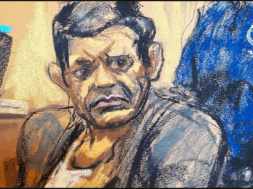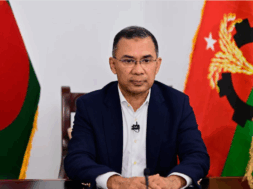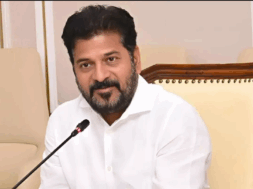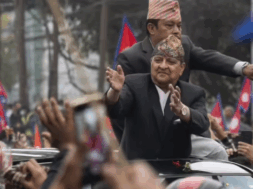
Bangladesh Government to move Interpol for Extradition of Sheikh Hasina from India
Manas Dasgupta
NEW DELHI, Nov 10: The Bangladesh interim government led by Nobel Laureate Mohammed Yunus, who had termed the erstwhile ruling party “Awami League” as a “fascist party,” is seeking Interpol’s assistance for the repatriation of the deposed prime minister Sheikh Hasina, and other Awami League “fugitives” to face trial for alleged crimes against humanity while in power.
Sheikh Hasina, who was also the chief of the Awami League set up by her father Sheikh Mujibut Rahman, who had led the “Mukti Yudha” to snatch freedom from Pakistan in 1971, is in India since her ouster in August.
Ms Hasina and her party leaders face accusations of ordering brutal suppression of the Anti-Discrimination Students Movement, resulting in numerous casualties during the July-August protests. The movement later intensified into a large-scale uprising, forcing Ms Hasina to flee to India on August 5.
According to the interim government’s report, at least 753 people were killed and thousands injured during the protests, which it termed crimes against humanity and genocide. Over 60 complaints of crimes against humanity and genocide have been filed against Hasina and her party leaders with the International Crimes Tribunal (ICT) and the prosecution team till mid-October.
“A Red Notice will be issued through Interpol very soon. No matter where in the world these fugitive fascists are hiding, they will be brought back and held accountable in court,” Law Affairs adviser Asif Nazrul told reporters here on Sunday after inspecting the status of renovation at the ITC which is housed in the Old High Court building on the Supreme Court premises.
Officials said a Red Notice is not an international arrest warrant, but rather a global request for law enforcement agencies to locate and provisionally arrest a person pending extradition, surrender, or similar legal action. Interpol member countries enforce Red Notices according to their own national laws.
The ICT was originally formed by the Hasina-led Awami League government in March 2010 to try the perpetrators of the crimes against humanity committed during the 1971 Liberation War. It later formed ICT-2, and at least six Jamaat-e-Islami and leaders of Hasina’s arch rival Khaleeda Zia’s Bangladesh Nationalist Party (BNP) were executed following the judgments of the two tribunals. The tribunal remained dormant since mid-June after its chairman retired.
The interim government reconstituted the tribunal on October 12. On October 17, the tribunal issued arrest warrants against Ms Hasina and 45 others, including her son Sajeeb Wazed Joy, who lives in the United States, and several of her former cabinet members.
The interim government had earlier said Ms Hasina and several of her cabinet colleagues and Awami League leaders would be tried in this special tribunal. However, Chief Adviser Yunus had said last month that his government would not immediately seek Hasina’s extradition from India, apparently to avoid a diplomatic tension between the two countries.
His government had earlier termed the Awami League as “fascist” party and had decided against giving it any permission to hold rallies in the country. Mr Yunus’s press secretary Shafiqul Alam in a Facebook post had said the interim government won’t tolerate any violence or any attempt to break the law and order situation in the country.
“The Awami League in its current form is a fascist party. There is no way this fascist party will be allowed to hold protests in Bangladesh,” he said. Mr Alam further cautioned that “anyone who would try to hold rally, gathering and processions by taking orders from the mass murderer and dictator Sheikh Hasina will face full force of the law enforcing agencies.”
Mr Alam’s statement followed a call from the Awami League on its verified Facebook page, urging supporters to gather at Shaheed Noor Hossain Chattar, or Zero Point, in Gulistan on Sunday to protest what they described as “misrule.” “Our protest is against the deprivation of the rights of the people of the country; our protest is against the rise of fundamentalist forces; our protest is against the conspiracy to disrupt the lives of the common people,” read the Facebook post. This was the first call for a rally by the Awami League since August 5, when Hasina fled to India amid a mass student-led uprising against her government.
Awami League also urged party men to stage rallies at grassroots levels across the country on Sunday in line with “the spirit of the call” as described in the Facebook post. The protest venue, Shaheed Noor Hossain Chattar, holds historical significance, as it was where Awami League youth leader Noor Hossain was killed on November 10, 1987 during a demonstration against the autocratic rule of the then military dictator General HM Ershad.
The interim government earlier banned Awami League’s student front Bangladesh Chhatra League over allegations of its “fascist role” during and before the July-August Anti-Discrimination Students Movement. Initially launched as a campaign for job quota reforms, the student-led movement intensified into a mass protest that ultimately led to the fall of the Hasina government.
While several political factions have called for the Awami League to be banned, Yunus had said such a decision was up to political parties. Some ministers of the interim government also oppose the ban, emphasising political inclusivity. Awami League’s main rival BNP led by former prime minister Khaleeda Zia also opposed banning any political party.














